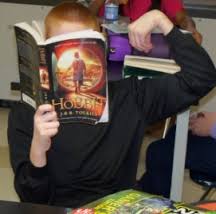In the spring of 2012, a group of English Language Arts educators from Franklin, MA, launched a highly successful middle school reading program around The Hunger Games.
In this five-part special series, the teachers who orchestrated the whole-school read will detail, step-by-step, this year’s initiative. Parts I and 2 focused on how the team made this year’s book selection, The Hobbit
, and encouraged student participation. Part 3 looked at some unexpected pitfalls the group faced based on book selection. Now, in Part 4, Mary Cotillo, Erin O’Leary, and Kathleen McNeice talk about how they decided which readers were granted passage to see the film adaptation—and why some participants will not be going. 
Bilbo Baggins was swept into a grand adventure without having to prove his burglary skills to the dwarves who employed his services. So, a savvy, finagling middle schooler may inquire, why do I have to prove anything to you? Why
should a voluntary activity have a qualifying quiz?
For the straight-A, join-everything, honesty-is-a-virtue kids, you are right. They don’t need it. But let’s think about the hobbits. As much as we love books and reading and fully expect others to match our enthusiasm, we are also teachers of early adolescents. And realists. And we know that if kids catch wind of an opportunity to leave school to watch a movie, they’re going to be lining up. To maintain legitimacy it becomes necessary for students to demonstrate that they earned the reward. After all, this isn’t a school-wide film viewing initiative. It’s a school-wide literacy initiative.
And here’s another thing we learned this year. When choosing a book that leans a tad toward the more challenging end of the spectrum, having a qualifying quiz gives students an opportunity to feel pride and success. They get to feel
good when they know the answers, bask in the congratulations of the teachers handing them their permission slip, and maybe even indulge in a heel click or two on their way back to class.
Call it reaping, call it riddling, call it whatever fits your book best—but make sure you
do it. We were clear from the outset (okay,
most of us were clear) that this is a celebration of the book. And when you have book nerds running this thing, you’ll want to be sure that everyone is there because they, too, read and loved the book.
We brainstormed a list of 70 or so questions and vetted them in our classroom after school. If all four of us couldn’t agree on the answer, or recall it quickly enough, it was out. We also made sure the questions were from different parts of the book (I already admitted the book nerd thing). The more questions you can create, the better. Choose three questions per sheet, require the kids to answer two out of three correctly, and there you go.
When will you conduct your winnowing? Our prior experience was to go to the students in the classrooms. This proved difficult and time consuming. Students were missing—at band, activities, or getting extra help. This also took us away from the students that needed OUR help during this time.
So, this year, we made the better decision to have the students come to us. And what better time for a captive audience than during their lunch? It did require giving up our quiet lunch time to query these Tolkien enthusiasts; however, it was well worth the sacrifice when you see students ten deep in front of you waiting for their turn. We had to push students into the cafeteria to eat their lunch first so we could stagger the masses.
We had 10 different versions of our quiz for the hobbits to choose from. A frequent question was “What if I don’t pass?” We encouraged everyone, not allowing any student to set themselves up for failure. We told them, “If you read the book, have confidence that you will be successful!”
We also knew that everyone wanted to be included.

With that in mind, the quizzes were answered at separate tables with no opportunity for sharing answers. There will always be the students that didn’t do the work but don’t want to miss out on the fun. We cheerfully asked everyone before they picked their quiz
when they finished the book. The majority of the kids cannot help but be honest. If they said they weren’t done we didn’t let them take the quiz. This is ultimately better for the student since one question was about the end of the book. In order to pass the student would
have to get the other two correct. We simply told these kids to finish the book and come back.
When they finished, the moment of truth was at hand. And believe me, these kids were nervous. Some prayed. Some closed their eyes while others bounced nervously from foot to foot. Honestly, they had worked hard and needed to feel that it was all worth it. You are that litmus test. If you are enthusiastic, chances are they will be too. To every student that passed came a heartfelt congratulations and the reward in the form of a movie poster (thank you, Warner Brothers!) and a permission slip to join us on the first part of our adventure, a private screening of the movie at the local theater. In addition, kids got high fives, atta boy/girl, woo hoos and pats on the back and everyone walked away feeling that they had won the race.
Not everyone will pass.
First, let me reassure you that we’re not out to trick anyone. The questions we chose are designed to assess comprehension, not inferencing skills or analytic ability. If a student happens to pull three questions and really and truly “blanks,” we’ll happily let them try again. Sometimes kids get anxious; in those cases, we verbally quiz them away from the crowds, usually posing such open-ended prompts as, “Tell me about the book.” But even after you account for legitimate lapses in memory, test anxiety, allergies, color blindness, and cholera, you are going to have a few cherubs who just can’t answer the questions. What
then?
Then they don’t go.
It takes willpower. It won’t always be easy. In this EGAT (Everybody Gets a Trophy) world, it’s hard to see a kid lose. You likely will have a sweet little girl who swears—with tears in her eyes—that she really
did read the book, and turning her away may be the hardest thing you have to do. But be strong! We speak from experience when we say those sweet little girls have admitted to reading plot summaries on Wikipedia in an effort to pass the quiz.
You may have parents sending e-mails 18 minutes after dismissal the last day of quizzing, challenging your judgment and demanding a retake. It’s possible you’ll have colleagues who ask you to make an exception for a kid who would just be devastated if they didn’t get to go.
Stay Strong. You aren’t being mean; you are upholding high standards. There is a significant difference!
Here’s the deal. The majority of these kids will be back next year. And maybe even the year after that. And if we bend the rules for one kid who later brags that she didn’t really read the book, then we’ve lost credibility not just for this year, but for the foreseeable future.
We all know this, but it bears repeating: students learn more from failure than from success. The students who choose not to participate this time around may later come to regret it. They will remember that feeling and it may be just the push they need to take the chance next time.
The challenges Bilbo faced on his journey only served to make him more resolute, further developing his character. Don’t rob kids of the chance to grow. If you plan your quiz questions carefully and are confident in the legitimacy of the process, sit back, stick to your guns, quiz the kids, and watch the triumphant readers parade back to lunch.
Mary Cotillo, Erin O’Leary, and Kathleen McNeice all teach at Horace Mann Middle School in Franklin, MA.
Read the rest of the series here:
Six Buses: The Quest for School-Wide Reading Begins!
The Quest, Part 2: Monday Morning Hobbit-Backing
The Quest, Part 3: Goblin Caves and Spider Webs
The Quest, Part 5: The Journey Pays Off in Unexpected Ways